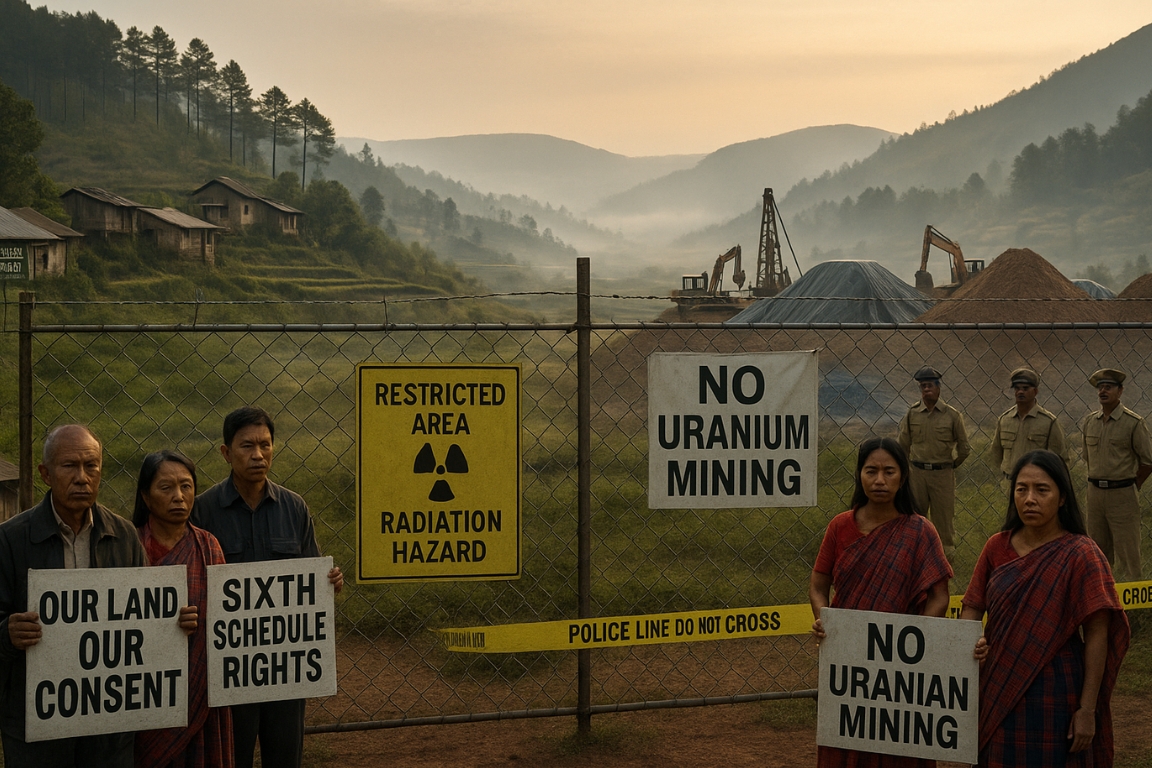The Union Government’s move to mine uranium in Meghalaya despite local opposition, and the Environment Ministry’s order exempting uranium and other strategic minerals from public consultation, has triggered protests by Khasi groups
Background
- Uranium deposits are found in Meghalaya’s Domiasiat and Wahkaji regions.
- Local Khasi communities have resisted uranium mining since the 1980s, citing health, environmental, and livelihood risks.
- The Ministry of Environment recently issued an Office Memorandum (OM) removing the requirement for public consultation in the mining of atomic and critical minerals.

Key Concerns
- Weakening of Safeguards: The use of Office Memorandums (OMs) dilutes independent oversight mechanisms and undermines established procedural checks.
- Erosion of Community Rights: Local communities feel their opposition is ignored, raising concerns over the violation of the principle of free, prior, and informed consent.
- Threats to Health and Livelihoods: Uranium mining poses severe risks such as radiation exposure, contamination of soil and water resources, and disruption of agricultural activities.
- Severe Ecological Consequences: Extraction of uranium is highly polluting and carries the danger of permanently altering fragile landscapes.
Tribal Rights and Legal Protections
- Sixth Schedule: Empowers Autonomous District Councils to protect tribal land and customs in the Northeast.
- Judicial precedents: Supreme Court in the Niyamgiri (2013) case upheld community consent for mining in tribal areas.
- Communities may challenge the OM in courts under constitutional provisions (Fifth and Sixth Schedules).
Government’s Rationale
- Uranium is vital for India’s nuclear energy program and national security.
- Officials argue extraction will reduce dependency on imports and secure long-term energy needs.
- Seen as part of a broader push for strategic resource self-reliance.
URANIUM IN INDIA
- Major Uranium Mining Areas:
- Jharkhand (Singhbhum district – Jaduguda, Bhatin, Narwapahar, Turamdih)
- Andhra Pradesh (Tummalapalle, Lambapur)
- Telangana (Nalgonda)
- Meghalaya (Domiasiat – potential reserves, not operational due to opposition)
- Uses:
- Fuel for nuclear reactors to generate electricity.
- Production of isotopes for medical, agricultural, and industrial applications.
- Strategic importance in defense and energy security.
Effective and Sustainable Use
- Community participation: Mining should proceed only with local consent.
- Environmental safeguards: Strict monitoring of radiation, waste disposal, and land rehabilitation.
- Diversification: Explore renewable energy and thorium-based reactors as alternatives.
- Responsible governance: Transparent decision-making and fair compensation for affected communities.
Conclusion
While uranium is critical for India’s energy security, ignoring local voices risks long-term social unrest and environmental damage. Sustainable development demands balancing strategic needs with constitutional protections and community rights.





